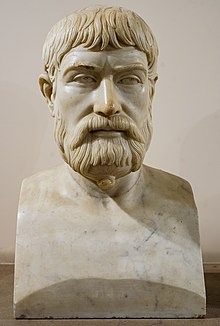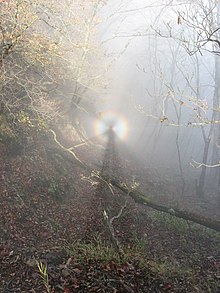Pindar
Appearance

Pindar (518 BC – 438 BC) was a Boeotian poet, counted as one of the nine lyric poets of Greece. The only works of his to have survived complete are a series of odes written to celebrate the victors in athletic games.
Quotes
[edit]
- Unless otherwise stated the translations used here are by Richard Stoneman, and are taken from Pindar, The Odes and Selected Fragments (London: Everyman Library, 1997)

To escape the eyes of god, he makes an error.

- οὔ τοι ἅπασα κερδίων
φαίνοισα πρόσωπον ἀλάθει᾽ ἀτρεκής·
καὶ τὸ σιγᾶν πολλάκις ἐστὶ σοφώτατον ἀνθρώπῳ νοῆσαι.
- ῥῆμα δ᾽ ἑργμάτων χρονιώτερον βιοτεύει
- For words
Live longer down the years than deeds. - Nemean 4, line 6; page 213. (473 BC?)
- For words
- ἐπάμεροι: τί δέ τις;
τί δ᾽ οὔ τις; σκιᾶς ὄναρ
ἄνθρωπος. ἀλλ᾽ ὅταν αἴγλα διόσδοτος ἔλθῃ,
λαμπρὸν φέγγος ἔπεστιν ἀνδρῶν καὶ μείλιχος αἰών
- Cf. Man is a dream about a shadow.
But when some splendour falls upon him from God,
a glory comes to him and his life is sweet.- As quoted in No-one (1985) by R. S. Thomas; also in R.S. Thomas : Identity, Environment, and Deity (2003) by Christopher Morgan, p. 27
- Cf. Man is a dream about a shadow.
- γλυκύ δ᾽ἀπείρῳ πόλεμος.
πεπειραμένων δέ τις ταρβεῖ προσιόντα νιν καρδία περισσῶς.- War is sweet to those who have no experience of it,
but the experienced man trembles exceedingly at heart on its approach. - Fragment 110; page 377.
- Variant translations: This phrase is the origin of the Latin proverb "Dulce bellum inexpertis" which is sometimes misattributed to Desiderius Erasmus.
- War is sweet to them that know it not.
- War is sweet to those not acquainted with it
- War is sweet to those who do not know it.
- War is sweet to those that never have experienced it.
- War is delightful to those who have had no experience of it.
- War is sweet to those who have no experience of it,
- γένοι' οἷος ἐσσὶ μαθών
- Become such as you are, having learned what that is
- Pythian 2, line 72.
- Variant translations:
- Be what you know you are
- Be true to thyself now that thou hast learnt what manner of man thou art
- Having learned, become who you are
- μή, φίλα ψυχά, βίον ἀθάνατον
σπεῦδε, τὰν δ᾿ ἔμπρακτον ἄντλει μαχανάν.- Do not yearn, O my soul, for immortal life!
Use to the utmost
the skill that is yours. - Pythian 3, line 61-62.
- Variant translation: Seek not, my soul, immortal life, but make the most of the resources that are within your reach.
- Do not yearn, O my soul, for immortal life!
Olympian Odes (476 BC)
[edit]- Ἄριστον μὲν ὕδωρ, ὁ δὲ χρυσὸς αἰθόμενον πῦρ ἅτε διαπρέπει
νυκτὶ μεγάνορος ἔξοχα πλούτου.- Best blessing of all is water, And gold like a fiery flame gleaming at night,
Supreme amidst the pride of lordly wealth.- Olympian 1, line 1-2; page 1
- Closer translation:
- Best is water, but gold stands out blazing like fire
at night beyond haughty wealth.
- Best is water, but gold stands out blazing like fire
- Best blessing of all is water, And gold like a fiery flame gleaming at night,
- ἁμέραι δ᾽ ἐπίλοιποι
μάρτυρες σοφώτατοι.- Days to come will prove the surest witness.
- Olympian 1, line 33-4; page 4
- Days to come will prove the surest witness.
- εἰ δὲ θεὸν ἀνήρ τις ἔλπεταί τι λαθέμεν ἔρδων, ἁμαρτάνει.
- σοφὸς ὁ πολλὰ εἰδὼς φυᾷ.
External links
[edit]- Works by Pindar at Project Gutenberg
- Selected odes, marked to show selected rhetorical and poetic devices
- Olympian 1, read aloud in Greek, with text and English translation provided
- Pythian 3, translated by Frank J. Nisetich
- Pindar by Gregory Cran, at the Perseus Project
- Pindar's Life by Basil L. Gildersleeve
- Words in blood, like flowers: philosophy and poetry, music and eros in Hölderlin, Nietzsche and Heidegger by Babette E. Babich.



